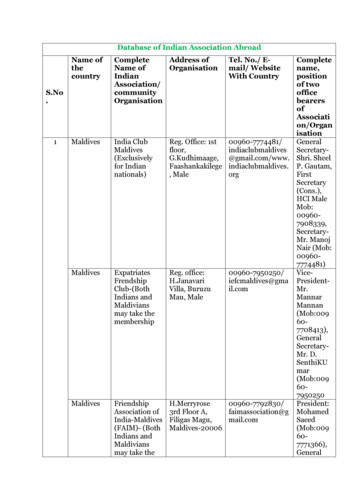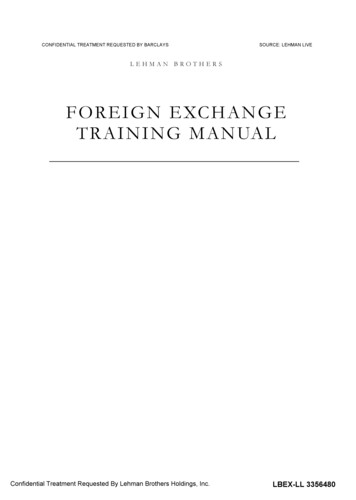
Transcription
The Complete Guideto Foreign LanguageImmersionFluentU
Copyright 2015 FluentFlix LimitedAll Rights Reservedwww.fluentu.com
ContentsIntroduction1. 9 Big Advantages of Learning a Foreign Languagev1Rachel Wagers2. How to Learn a Language Fast: 5 Ways to SetYourself Up for Success7Frank Macri3. How to Learn a Language by Yourself: 5 RockstarTips for Success13John Fotheringham4. 5 Killer Language Learning Strategies Guaranteed toHelp You Make Time21John Fotheringham5. 8 Ways to Get Daily Language Practice on YourCoffee Break32Lizzie Davey6. 9 Imaginative Tips for Absorbing Vocabulary Like aSponge40Christina Hewitt7. 12 Wicked Fun Ways to Learn Any Language47Maureen Stimola8. 5 Tips for Creating a Rock Solid Foreign LanguageReading Habit57John Fotheringham9. 6 Tips for Effortless Language Learning with ForeignMovies65Alex Owen-Hill10.Immerse Yourself: 12 Ways to "Go Native" WithoutGoing AbroadKatherine Kostiuk73
IntroductionLearning a foreign language is an exciting endeavor that can change your lifeby exposing you to new cultures, people and places. Furthermore, speaking asecond language undeniably opens an array of new doors for you in terms ofemployment.But in order to reap these benefits, first you need to learn the language.So what’s the best way to soak up a foreign language in the shortest amountof time? Immersion.Now, we know that few have the time and money to simply hop on a plane andhead to the nearest country that speaks your target language, and that’s exactlywhy we’ve put this guide together for you.There are so many useful ways, tools and tricks to immerse yourself in aforeign language right now, no matter where you currently live.Let’s get started—instant language immersion is but a page turn away!
[1]9 Big Advantages of Learning a ForeignLanguageRachel WagersWe live in a hyper-connected, fast-paced world, and things aren’t changinganytime soon.How can you keep your head above water?You need to be hyper-awesome to survive.That means you’ll have to develop some special advantages to get a boost,help yourself stand out and make you better fit for survival in this crazy,modern world.
FluentUAs our world becomes more and more connected through technologicaladvances, it’s becoming increasingly obvious that learning another languageis beneficial for many reasons.Here we present just a few of the many positive side effects of becomingbilingual (or multilingual).9 Advantages of Learning a Foreign Language ( Resources!)1. Meet New PeopleOne of the most phenomenal benefits of learning a new language? Doors areopened to you around the world. If you’re learning in a group setting, youimmediately have new friends to share your new language with.If not, then once you go somewhere and are actually able to employ whatyou’ve learned, you’ll be surprised how open people are when you speak theirmother tongue.2. Employers Love It (And They’ll Love You More)If your resume accolades include fluency in a second language, your chancesof employment in today’s economy are much greater for you than for thosewho speak only one language.Multilingual people are able to communicate and interact within multiplecommunities. Potential employers consider this a valuable asset in anemployee’s skill set, as they’re able to connect with a broader range of people.In this new age of start-ups, companies are increasingly breaking into newmarkets. You up your personal and professional value if you’re able tonegotiate with manufacturers in another country or communicate withcustomers who don’t speak your native language.Not to mention, your ability to speak a second language conveys that you’remotivated and driven to learn new skills, and this also gives you a competitiveedge over those who haven’t yet become bilingual.2
3The Complete Guide to Foreign Language Immersion3. It’s Becoming EssentialMany would argue that bilingualism is becoming a progressively necessaryand essential skill for anyone who wants to keep up with today’s rapidlyincreasing global economy.As more and more people recognize the importance of learning an additionallanguage, those who only speak one language will begin to get left behind inour shift towards a more integrated and connected global society.4. It’s Great for TravelingAustrian philosopher Ludwig Wittgenstein is credited with saying that “thelimits of your language are the limits of your world,” and he was right.Knowing more than one language opens up your vacation destinationpossibilities. Traveling through a foreign country becomes much easier ifyou can speak the language of that country. Fluency isn’t required. Localsanywhere appreciate that you’ve taken the time to at least attempt to learn andcommunicate in their tongue. It shows a greater level of respect and is an easyway to meet new people.Also, getting to a comfortable speaking level in a foreign language is a greatmotivator to get you out there and practicing your new language in a newcountry.5. After Learning One, It’s Way Easier to Learn AnotherAs you begin to learn a second language, you’ll find that the acquisitiontechniques you’re using can be applied to learning additional languages aswell.The positive cognitive effects of learning to speak a second language can trainthe brain to analyze and process different linguistic structures. It’s not specificto your first target language—it’s a skill that can be applied to learning anylanguage.You’re increasing your ability to replicate the process with multiplelanguages. This is called “metalinguistic awareness,” where your brain learnsto identify the techniques of learning a language and break them down into a
FluentUseries of steps. After learning one language, you retain the muscle memory.Your brain will intrinsically understand how to learn a language and howdifferent languages are structured, through increased awareness of syntax,grammar and sentence structure.6. You Become SmarterAcquiring a second language improves your memory and increases yourattention span. The process of becoming bilingual exercises your brain,challenges you to concentrate and boosts your problem solving skills.Bilingual students tend to score higher on standardized tests than monolingualstudents, especially in the areas of vocabulary, reading and math. As youlearn to toggle from one language to another, you improve your multitaskingabilities. Bilingual individuals have also been shown to be more logical andrational, have better decision-making skills and be more perceptive and awareof their surroundings.Learning a second language also improves your native language, as it teachesyou the mechanics and structure behind any language—not justnew languages.7. You’ll Stay Smarter for LongerRecent research has shown that bilingualism can stave off the effects ofAlzheimer’s and dementia by years. Regardless of their education level,gender or occupation, bilingual subjects in the linked study experienced theonset of Alzheimer’s, on average, 4.5 years later than monolingual subjectsdid.Study results out of the American Academy of Neurology are showing thatspeaking more than one language increases the amount of neural pathways inthe brain, allowing information to be processed through a greater variety ofchannels. They’ve also begun to demonstrate that multilingualism improvesdevelopment in the brain’s areas of executive function and attention, no matterwhat age the language learner is.4
5The Complete Guide to Foreign Language Immersion8. It Boosts Your CreativityResearchers are also concluding that multilingual speakers are more creativethan monolingual speakers. Learning a foreign language improves not onlyyour ability to solve problems and to think more logically, it also makes youexperiment with new words and phrases.Leveling up your second language skills forces you to reach for alternatewords when you can’t quite remember the original one you wanted to use.It improves your skills in divergent thinking, which is the ability to identifymultiple solutions to a single problem.9. It Builds Up Your Self-confidenceYou’re about to teach yourself to believe, “Yes, I can.” It’ll become your newpersonal mantra.Confidence increases when a new skill is mastered, and learning a foreignlanguage is no different. It increases your self-confidence. And let’s faceit: Confident people are more interesting than those who are unsure ofthemselves. The techniques you use to develop a second tongue result in agreater sense of open-mindedness.In order to master a new language, conversations with native and fluentspeakers are essential. If you’re shy but want to meet new people, using theexcuse that you want to practice your speaking skills is a great opener anda doorway to making new friends, expanding your horizons and broadeningyour life experiences. Plus, who doesn’t want to be more interesting?So, How Do I Get Started?Fortunately, gone are the days where the only way to learn a second languagewas to either become stranded in a foreign country or go back to high schoollanguage classes (and be honest, did you actually learn all that much inthere?). There are now many different online lessons and tutorials to help youbecome proficient in the language of your choice.FluentU stands out among language learning websites, thanks to the hugerange of learning opportunities it provides.
FluentUFluentU takes real-world videos—like music videos, movie trailers, newsand inspiring talks—and turns them into personalized language learninglessons. It’s all stuff that native speakers actually watch.You can use FluentU’s videos, interactive subtitles, vocabulary lists,personalized flashcards and more to improve your reading, writing, speakingand listening skills—all while exposing yourself to the average, everydaylanguage spoken by natives.You’ll become immersed in the way people actually speak and communicate,as opposed to the phrases you learned back in high school (because how manytimes have you actually used,“¿Donde está la biblioteca?”)No matter which tools you use when you decide to learn a language, justdecide to learn one! You won’t regret it.6
[2]How to Learn a Language Fast: 5 Waysto Set Yourself Up for SuccessFrank MacriWhat if I told you the ordinary ways of learning a language aren’t actually thathelpful?What if I also told you those same methods are not only ineffective, but a hugewaste of time?Yes, it’s true. But your time doesn’t have to be thrown away whenever youdecide to pick up a new language.Thankfully, there are much more efficient ways to speed up the processof learning a new language. These strategies will help you chop off someprecious learning time while still increasing your language acquisition.
FluentUWithout further ado, here are the five biggest time-wasters when learning anew language and how we can correct them.How to Learn a Language Fast: 5 Ways to Set Yourself Upfor Success1. Immerse Yourself in the Country and the LearningThe ordinary way: Immersing yourself solely in the countryWhen you live abroad, it’s easy to think that by putting yourself in the culture,you’ll naturally begin to start picking up the language. News flash: Immersionis a waste if you don’t know what’s being said most of the time. Whileimmersion may have worked when we were babies, our brains make it a lotharder to formulate language through immersion as adults.When I was living in China, I met several expats who had been living inthe country for three, five and even nine years but still had not picked upthe language. To put that into perspective, nine years means over 3,000 dayswithout learning Mandarin. Yikes!At first, I couldn’t believe how someone could live in a country so longwithout learning the language. But over time, I began to see the loopholes thatcome from language immersion. For instance, most natives will at least try tospeak English when you approach them, even if you are living in their country.While in China, I was shocked to find that natives were eager to practice theirEnglish skills with me. While I was glad to do this, it prevented me frompracticing my Mandarin at times.What to do instead:Immerse yourself in the learning, not just the environment. If you do moveto the country that speaks the language you are studying, great! That simplymeans there are more chances for you to seize learning opportunities. Resistthe urge to use English. Even when you are surrounded by others speaking thelanguage, the responsibility still lies on you to study, learn and practice.8
9The Complete Guide to Foreign Language ImmersionIf you’re not living in the country that speaks the language you would liketo learn, design your home environment into a place where growth isunavoidable. Create visual cues that encourage you to study at times younormally wouldn’t. This can mean changing your cell phone’s language oreven that of your Facebook account. Give it a shot!2. Focus on the Most Commonly Used Words andExpressionsThe ordinary way: Focusing on vocabularyThis is what we call “textbook learning.” In other words, you are mostlyfocused on rote memorization. While this may build your arsenal of newwords, if won’t get you very far when actually implementing the language.Speaking a new language is not a formulaic process. It requires quick andflexible thinking. Unless you plan on sounding like a robot, you may want todevote your attention to areas outside vocabulary.What to do instead:Strategize and prioritize your learning by focusing on what matters. Mandarinis a language of over 3,000 characters. But did you know that by learning the500 most commonly used words, you acquire approximately 75% of languageunderstanding?This is not just isolated to Mandarin. In just about all languages, about 20% ofthe vocabulary accounts for 80% of understanding. So why waste time tryingto learn more words?While vocabulary is important, it must be considered holistically whenlearning a new language. Identify what words, phrases and expressions willget you the most bang for your buck, and work from there.
FluentU3. Be Mindful During the Learning ProcessThe ordinary way: Rushing the learning process and crammingIt may be tempting to cram loads of information into your head and expect itto stay there. The truth is, acquiring any new skill takes time. Canadian authorMalcolm Gladwell’s “10,000 Hour Rule” theorizes that it takes 10,000 hoursof practice before one can truly master a skill.He came to this conclusion by studying the lives of some of the world’s mostsuccessful people and observing how long it took them to become masters attheir skills. No matter what language learning hack you consider, be aware ofhow you are spending your time.For those of you wanting to learn a new language fast, the idea of slowingdown may seem counterintuitive or abstract. It may be tempting to quickly fillour brains with as much information as we can in the shortest amount of time.Unfortunately, cramming usually doesn’t end up help us achieve long-termlearning.What to do instead:Be mindful while learning a new language. It’s easy to start a new languagewith our heads caught up in the fact that we aren’t yet perfect. We become sofocused on the end goal of becoming fluent that we lose track of our progressalong the journey.Not only will presentness help you absorb new information in the moment,it will also aid your long-term memory. Try more effective and efficientmethods, such as a Spaced Repetition Software (SRS), and you will bepleasantly surprised with the amount of information your brain holds on to.You can also try taking short breaks from your studying to reflect and practicewhat you’ve learned. These breaks can be as short as three minutes andconsist of you simply summarizing what you’ve learned. Play around withnew words and phrases. This simple exercise can help prevent you from goingon autopilot while studying by honing in on every step of the learning process.10
11The Complete Guide to Foreign Language Immersion4. Be an Active LearnerThe ordinary way: Learn passivelyAll learning is not created equal. In fact, most of the time we learn in a passivestyle that lacks any kind of critical thought. Think of that professor you had inthe past who conducted lessons by parroting words from the textbook.There is no classroom engagement, dialogue or discussion. Unfortunately,we’ve been conditioned to learn in this one-way fashion where information ispassively given to us without any response or analysis.What to do instead:Become an active learner. The brain works on a use-it-or-lose-it style,meaning you must apply whatever you learn. After memorizing a new phrase,say it aloud 30 times. After learning how to write a new Mandarin character,rewrite it 20 times. And then use the new phrase or character in a realsituation: with a language partner or writing online to a native speaker, forexample. The key is to implement what you learn until it sticks.To make words and phrases stick quickly, a great tool for some in contextactive learning is FluentU. FluentU takes real-world videos—like musicvideos, movie trailers, news and inspiring talks—and turns them intopersonalized and engaging language learning lessons. Learning the words andphrases through authentic videos makes them stick easily, making you learnfaster.5. Become Passionate About Learning Your New LanguageThe ordinary way: Treating your new language like a hobbyHobbies are activities we enjoy doing at our own leisure. They are simply forthe purpose of fun, but there’s no pressure to keep at them every day.This mentality may seem trivial, but it can mean the difference between youspending five months and five years when learning a new language. If you arenonchalant about learning, you’ll achieve nonchalant results.
FluentUWhat to do instead:Make language learning a passion. Merge the fun of language learning withthe commitment to follow through. Knowing that you want to learn a newlanguage is not enough to get us to actually take action.Give yourself clarity on what exactly compels you to learn a new language.Figure out the why behind your desire to learn. What’s the goal behind thegoal? What’s the bigger picture here? How will learning a new language openopportunities in your future? Simply answering these questions for yourselfwill motivate you on much higher level to take action when necessary.While learning any language takes time, implementing these strategies willskyrocket your efficiency while minimizing your learning time. As always,have patience with the process and enjoy every achievement (and failure)along the way.12
[3]How to Learn a Language by Yourself:5 Rockstar Tips for SuccessJohn FotheringhamSo you’ve decided that you want to learn a second language.Rock on! Good for you!But now what? How are you going to do this on your own?Are you aiming too high? Can you really learn a language by yourself?Yes you can! So let’s leave the doubts right here at the door and never lookback.You can learn a language on your own, and to set you up for success I’m
FluentUsharing five awesome tips that are filled to the brim with actionable items youcan start today!How to Learn a Language by Yourself: 5 Rockstar Tips forSuccess1. Work with—Not Against—Your Psychology“In language learning, it is attitude, not aptitude, that determines success.”-Steve KaufmannSet S.M.A.R.T. goalsIf you don’t know where you are going, how are you ever going to get there? Iknow, it sounds like something that would be printed on one of those cornymotivational posters from the ’80s. But it’s still a valid question to pose tooneself before embarking on a self-guided language learning mission.When most people think of goal setting, short-lived New Year’s resolutionsprobably come to mind. Many of us set out to conquer the world on January 1,vowing to learn a new language, drop one’s spare tire, get out of debt, etc. Yeta few weeks later, we somehow find ourselves watching bad TV instead ofstudying, stuffing our face holes with pizza instead of broccoli and charging anew big screen on our Visa.But why does this happen? Is it simply a matter of laziness and weaknessof character? Perhaps for some. But I think the real problem for most peopleis poorly defined goals. While setting goals is no guarantee that you willactually achieve them, it is an important step in the right direction.So what’s the problem with most goals, especially the aforementionedresolutions? They are either vague, unmeasurable, unattainable, irrelevant toone’s life, have no clear deadline or all of the above. To prevent such wimpygoals, try instead to employ the acronym S.M.A.R.T. to your languagelearning goals. A “smart” goal is: Specific. Measurable.14
15The Complete Guide to Foreign Language Immersion Attainable. Relevant. Time-bound.Instead of saying, “I want to learn Spanish” (What do you mean by “learn”?By when? For what purpose?), you can instead say, “I am going to speak withmy Spanish language partner every Wednesday for 15 minutes for the next 6months.” See the difference?Embrace the process over the destinationSetting goals is essential, but contrary to popular belief, picturing yourselfattaining those goals is actually not as helpful as you might think. Positivethinking is great, but what ends up happening for many people is that theysubconsciously think, “I have already reached the goal, so why work so hard?”I know, it sounds crazy, but it’s a real phenomenon. So set goals, yes, butinstead of picturing yourself crossing the finish line, visualize yourselfactually running the race.View language learning as an adventure, not a choreInstead of telling yourself, “I have to study a language today,” use a littlelinguistic jujutsu and say instead, “I get to study a language today.” Yes,it’s a small change, but it can have a significant effect on your outlook andlikelihood of staying the course day in and day out.Remember that languages are doorways into new lands, new cultures, newfoods, new music and perhaps, new romances. The minutes and hours youspend today, could earn you years of joy down the road.Choose inherently enjoyable learning activitiesIf you wouldn’t watch a soap opera in your native language, why would youforce yourself through one in your target tongue? (Well, all right, unlessyou’re studying Spanish—because Spanish soap operas are their own uniqueform of entertainment! But you see my point). Part of making language
FluentUlearning fun is doing things in the language that you would do anyway,activities that bring you joy and fulfillment.For me, it’s learning martial arts or other physical activities. The immediatephysical context makes it much easier to figure out what’s happening, helpsmake vocabulary stick (especially if someone sticks a punch because I did thedrill wrong) and is inherently enjoyable in its own right. Do a quick surveyof your personal passions and find some opportunities to do something withthem using your target language.2. Design Your Environment to Maximize Language Inputand Output“Excellence is never an accident. It is always the result of high intention, sincereeffort, and intelligent execution; it represents the wise choice of manyalternatives. Choice, not chance, determines your destiny.”-AristotleReplace your media with target language equivalentsIt’s imperative to stop “choosing” to study throughout your day. When youmake your target language the only option, you have no choice but to getvaluable exposure each and every day. And one of the best ways to limitchoices and maximize learning is to switch all your sources of media (TV,movies, magazines, blogs, podcasts, etc.) to your target language. Placeforeign film DVDs by the DVD player. Replace the magazines in thebathroom. Put a stack of foreign language manga next to the bed. You get theidea.And if you’re looking for an easier and natural way to learn from foreignlanguage media, then you should check out FluentU. FluentU takes real-worldvideos like music videos, movie trailers, and TV shows and turns them intolanguage learning experiences. It’s a terrific way to quickly pick up naturalvocabulary and to learn with context.Change all your devices to your target languageThis one is a game changer. Given how many hours a day most of us spendwith our eyeballs glued to our various screens, changing the device display16
17The Complete Guide to Foreign Language Immersionlanguage can significantly increase our target language exposure. Granted,this increases passive reading input, not active speaking output (the mostimportant language activity), but hey, every little bit helps.Best of all, you can make lots of educated guesses about new vocabularybased on your previous experience using the user interface in English. Forexample, if you are new to Japanese, you probably don’t know the word for“Settings” in the language yet, but once you change your iOS interface toJapanese, you will see that ? (settei) is written below the “Settings” icon.Boom. That’s one more word in the bag.Label key items in your home and office in the target languageAn old idea, but a good one. Just as changing your device language increasesexposure to contextual vocabulary throughout your day, labeling items aroundyour home and office accomplishes much of the same goal. The difference ofcourse is that these labels will be providing less tech-centric input, meaningyou’ll learn lots of useful real-life vocabulary that’s necessary if you evertravel or live abroad.Create visual study cues and “When I , then I ” statements topromote new habitsCreating new habits (or quitting old ones) can be an extremely difficult task,but there are a few tricks to stack the behavior change deck in your favor: Create constant visual reminders in your environment. Placeflashcards on your nightstand, put language apps on the home screen ofyour device and swap out your media as discussed above. Create some “When I do X, then I do Y” statements. For example,“When I wake up, then I immediately review 15 flashcards.” Make thesestatements tied to specific times of day, specific locations or otheractivities you do on a regular basis.3. Track Your Progress“What gets measured gets managed.”-Peter Drucker
FluentUMeasure progress in hours, not yearsMost people assume that it will take years to learn a foreign language. Andsure enough, it does seem to take most folks at least a few years to reachconversational fluency in a foreign language. But this is because most peopleonly put in a few hours (if not a few minutes!) each week.But if you made language learning your number one priority and put in atleast an hour every day, you would be able to reach your fluency goals farfaster. Forget about years. Such measurements of time are too big and toointimidating to be of much good for our purposes.Instead, try to keep track of how many hours you spend actively learningthe language each day. If you are not improving as fast as you want, theanswer is very likely that you are not putting in enough hours each week. Butunless you measure, you won’t know. You will likely feel like you are puttingin gobs of time, but may in fact be doing very little.Record yourself speaking at least once a monthWhile there are many ways to measure your progress, unscripted speaking isby far the best test of your actual level in a language. It doesn’t matter whatdevice you use (smartphone, tape recorder or phonograph), just make sure youdo it at regular intervals. I recommend once a month so that there will beenough time to see—or rather hear—observable progress.Write a daily journal in your target languageWhile speaking ability is the main goal for most language learners, writingskills should not be underestimated. Keeping a daily journal in your foreignlanguage is a great way to both improve your word smithing skills while alsomeasuring your progress over time.The journal doesn’t need to contain beautiful, flowing prose. The onlyrequirement is that you get words down on paper (or on the screen) on a dailybasis. Months later, you can then go back and review what you’ve previouslywritten. You will be amazed how far you’ve come!18
19The Complete Guide to Foreign Language Immersion4. Create a Tribe: Learning “By Yourself” Does Not MeanLearning “Alone”“Yes, I think it’s okay to abandon the big, established, stuck tribe. It’s okay tosay to them, ‘You’re not going where I need to go, and there’s no way I’m goingto persuade all of you to follow me. So rather than standing here watching theopportunities fade away, I’m heading off. I’m betting some of you, the best ofyou, will follow me.'”-Seth GodinGet a tutor, language exchange partner or private teacherThough the title of this post is “How to Learn a Language by Yourself,” I amin no way encouraging you to learn in isolation. You must (I repeat, must)apply what you learn by interacting with native speakers. What I am saying isthat you don’t need to attend formal classes to do that.With the advent of Skype (and similar VOIP services), you can now interactwith native speakers of nearly any language, just about everywhere. There arecountless free (or at least affordable) language exchange sites, some of whicheven connect you with professional teachers. My favorite is iTalki, but youcan Google around until you find something you like.Find or make friends learning the same languageLearning alone is not only boring, it’s also a recipe for failure. Having atleast one friend learning the same language as you means that you will havea trusted confidant to share with, whether it’s sharing resources or ventingfrustrations. It also allows for a little friendly competition.5. Consistency Trumps Quantity: Make at Least a LittleProgress Every Day“You don’t set out to build a wall. You don’t say ‘I’m going to build the biggest,baddest, greatest wall that’s ever been built.’ You don’t start there. You say, ‘I’mgoing to lay this brick as perfectly as a brick can be laid. You do that every singleday.
2. How to Learn a Language Fast: 5 Ways to Set Yourself Up for Success Frank Macri 7 3. How to Learn a Language by Yourself: 5 Rockstar Tips for Success John Fotheringham 13 4. 5 Killer Language Learning Strategies Guaranteed to Help You Make Time John Fotheringham 21 5. 8 Ways to Get Dai











